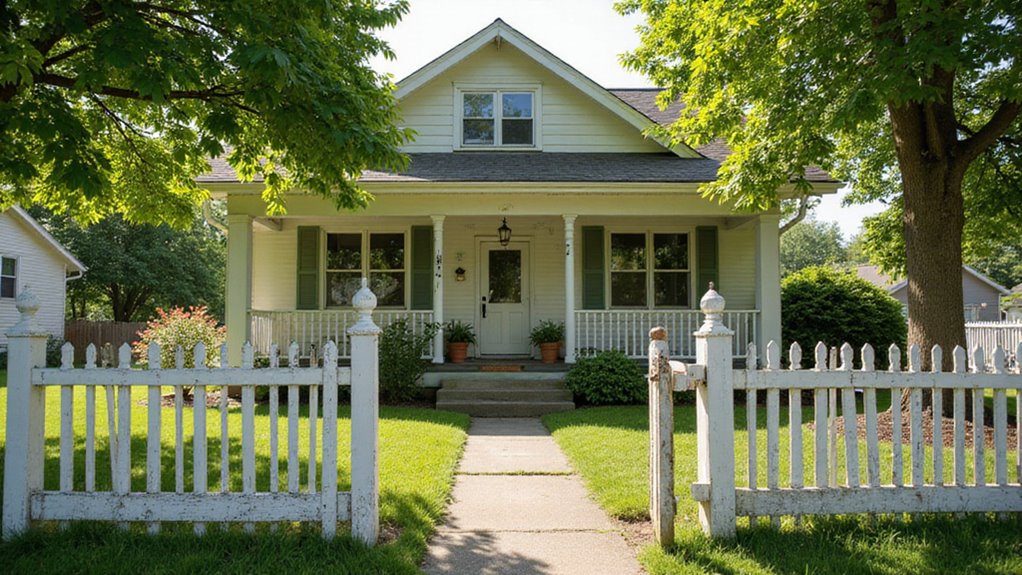Drowning in dusty photo albums and faded memories, an inherited home becomes both blessing and burden. The property sits in limbo while grief lingers, complicated by unfamiliar legal processes and financial concerns. Meanwhile, market opportunities pass by, potentially costing thousands in lost value. Professional guidance can transform this overwhelming situation into a manageable, even profitable transition.
To sell an inherited house, first establish legal ownership through probate court or proper transfer documentation. Then prepare the property by clearing personal items, making strategic repairs, and possibly staging before choosing your selling method. Different approaches include listing with a real estate agent, accepting a cash offer, or selling at auction. Each option offers distinct advantages depending on your timeline and financial goals.
In this blog I will explore everything you need to know about selling an inherited house successfully.
Key Takeaways
- Determine and verify legal ownership, including probate or transfer documents, before listing the property for sale.
- Prepare the home by clearing personal belongings and making necessary repairs to boost appeal.
- Choose a selling method: real estate agent, cash buyer, for-sale-by-owner, or auction, based on your timeline and goals.
- Understand tax implications, including stepped-up basis and potential estate or capital gains taxes.
- Facilitate the sale by coordinating legal paperwork, handling negotiations, and ensuring all heirs agree on the sale process.
What Is an Inherited House?

An inherited house is property you receive after someone passes away, and its legal transfer depends on how the owner held it.
There are different ways inheritance can happen, such as through probate, joint tenancy, or trusts. Knowing these options helps you understand what steps to take before selling.
Legal Definition of Inherited Property
Inherited property is any asset you receive after someone dies. This includes real estate, investments, personal items, and cash. Property can transfer through probate, joint tenancy, or trusts according to inheritance laws.
The definition matters because it affects your tax obligations and ownership rights. For instance, inherited homes often receive a stepped-up tax basis.
Furthermore, clear understanding prevents title issues when selling inherited assets. Many beneficiaries need to know these distinctions when managing estates. As a result, proper identification helps ensure lawful transfers and responsible estate handling.
Types of Property Inheritance Scenarios
Inherited property transfers through four main methods. Probate properties pass through court proceedings when someone dies with only a will or no estate plan.
Joint tenancy with right of survivorship automatically transfers ownership to surviving owners. Transfer-on-death deeds directly convey property to named beneficiaries without probate.
Trusts hold and distribute assets according to specific instructions. Each method affects your legal steps differently.
The inheritance type determines tax implications and transfer timelines. Moreover, some methods help avoid probate entirely.
Understanding your specific inheritance scenario simplifies the transfer process and prevents potential legal complications.
What Legal Steps Must Be Taken After Inheriting a House?

Once you’ve inherited a house, you need to complete the legal paperwork to transfer ownership properly.
This involves going through probate or using other legal methods to update the deed and clear any titles. You’ll also have to handle any existing mortgages or liens before selling the property.
Probate Process Explained
Probate transfers ownership of an inherited house through legal steps. A court must verify the will and approve property transfers to heirs.
The process begins by filing the deceased’s will with the probate court. Next, all creditors must be notified about the death. The executor must settle outstanding debts and liens against the property. As a result, the title becomes clear for transfer.
Finally, the court grants approval to transfer the deed. This approval officially recognizes you as the new legal owner. Typically, the entire process takes several months to complete.
Obtaining the Deed and Clear Title
You must update the deed to reflect your ownership after completing probate. This step transfers the property legally into your name. The county recorder’s office will require specific documentation to process this change.
The deed must be properly recorded to secure your ownership rights. Most states require recording within 30-90 days of property transfer.
Clear title means no liens, disputes, or legal claims exist against the property. Without clear title, you may face challenges when selling or refinancing.
Legal professionals can help ensure all documents meet requirements. Title companies offer insurance to protect against unforeseen issues.
Dealing with Existing Mortgages or Liens
You must resolve all mortgages and liens before selling an inherited house. Start with a title search to identify all debts attached to the property.
Contact each lender directly to request payoff amounts and discuss settlement options. Mortgage lenders typically require full payment when ownership transfers through inheritance.
The probate process should address these financial obligations before the sale can proceed.
Remember that unpaid taxes, contractor liens, or judgments might also affect the property.
A real estate attorney can help navigate complex situations involving multiple debts. In most cases, proceeds from the home sale will cover these obligations at closing.
How to Prepare an Inherited House for Sale?

To get your inherited house ready for sale, start by clearing out personal belongings with everyone’s agreement.
Then, make any necessary repairs or upgrades to boost its appeal and meet local standards. Finally, consider staging the home to attract buyers and sell faster at a better price.
Clearing Personal Belongings
Remove all personal items from the inherited house before selling. This step ensures a clean property and fair distribution among heirs. First, gather all involved parties and create an inventory of valuable items.
Document each item’s removal with signatures from all heirs to prevent future disputes. Then sort belongings into categories: keep, donate, sell, or discard.
During this process, verify your legal authority to access the property. You must have proper documentation if the home is still in probate.
Additionally, consider hiring professional help for large estates. This methodical approach respects everyone’s interests and makes the selling process smoother.
Essential Repairs and Renovations
Focus on critical repairs that boost your inherited home’s value before selling. Fix broken fixtures, update outdated features, and complete necessary upgrades to attract potential buyers.
Most inherited homes need $5,000-$15,000 in essential repairs to meet market standards. Small investments often yield returns of 2-3 times their cost at sale time.
A move-in ready home appeals to more buyers and typically sells faster. Modern kitchens, refreshed bathrooms, and neutral paint colors offer the best return on investment.
Meanwhile, addressing structural or safety issues prevents inspection problems later in the selling process.
Staging Tips for Inherited Properties
Effective staging transforms inherited properties into appealing homes for potential buyers. Start by removing all personal items to create a neutral canvas. This helps visitors imagine their own lives in the space.
Repair visible damage, repaint worn walls, and replace outdated fixtures to increase property value.
Position furniture strategically to showcase room dimensions and natural traffic flow. Open spaces feel larger and more inviting to visitors. The right furniture arrangement highlights architectural features while minimizing flaws.
Furthermore, clean thoroughly and introduce natural light wherever possible. A bright, fresh-smelling home makes a stronger first impression. In addition, focus on curb appeal by tidying the exterior and entry areas.
What Are Your Options for Selling an Inherited House?
You have several options for selling an inherited house, including listing with a real estate agent, selling to cash buyers, doing a for-sale-by-owner deal, or using an auction.
Each method offers different advantages and considerations, so it’s important to choose the one that fits your timeline and goals. Consider what works best for your situation before moving forward.
Traditional Real Estate Agent Listing
A real estate agent can effectively market your inherited Oklahoma property to qualified buyers. Agents handle the paperwork, negotiations, and legal requirements on your behalf. They also provide pricing expertise to maximize your sale price.
Before listing, ensure you have legal ownership through probate or transfer documents. You’ll need to pay a commission fee of typically 5-6% of the final sale price.
Clean the property and make minor repairs to increase appeal. The agent will create professional listings with photos and coordinate showings with potential buyers.
This approach respects the deceased’s legacy while reducing your stress during this emotional time.
Selling to Cash Home Buyers
Cash home buyers purchase inherited properties quickly with minimal hassle. They make direct offers without bank approval delays or complex negotiations. You can skip repairs, showings, and agent commissions. This approach provides immediate funds when you need them.
The process usually takes 7-14 days from offer to closing. Most cash buyers cover all closing costs and purchase properties in as-is condition.
For those dealing with inheritance, this convenience eliminates additional stress during a difficult time.
Furthermore, cash sales simplify matters when multiple heirs are involved. The straightforward transaction creates clear closure for everyone.
For Sale By Owner Approach
Selling an inherited house yourself saves on agent commissions and gives you direct control. First, verify your legal right to sell by ensuring the title is clear and free of liens.
Court approval may be required depending on your state’s probate laws. Always maintain open communication with all heirs to prevent potential conflicts later.
This approach requires more work but potentially yields higher profits. You’ll handle all marketing, showings, and negotiations personally.
However, the responsibility for paperwork and legal compliance falls entirely on you. Many sellers find the trade-off worthwhile when they’ve time to manage the process properly.
Auction Sales
Auction sales offer a quick solution for selling inherited houses when heirs disagree. This method resolves property disputes through a transparent, competitive bidding process. The public nature ensures fair market value while eliminating lengthy negotiations between family members.
Furthermore, auctions typically complete within 30-45 days from listing to closing. Most states require only a simple majority of heirs to approve an auction sale.
Professional auctioneers handle all marketing and buyer verification. As a practical option, auctions remove emotional decision-making from the selling process. The firm sale date creates urgency among potential buyers.
How to Handle Tax Implications When Selling?
When selling an inherited house, you need to understand how capital gains tax applies and what exemptions you might qualify for.
The stepped-up basis rule resets the property’s value to its market value at the time of the owner’s death, which can reduce your tax liability.
Knowing these tax rules helps you plan your sale more effectively and avoid unexpected costs.
Understanding Capital Gains Tax
Capital gains tax applies to profits made when selling inherited property. The tax is calculated using stepped-up basis, which values the property at the owner’s death date rather than original purchase price.
You’ll pay taxes only on gains above this stepped-up value. The holding period determines your tax rate—short-term or long-term capital gains rates apply. This reset often reduces your tax burden significantly when selling soon after inheritance.
Certain exemptions may reduce your tax liability. Primary residence exclusions can eliminate up to $250,000 in gains for individuals. Additionally, timing your sale strategically might lower your overall tax obligation.
Available Tax Exemptions
Several key tax breaks can reduce your burden when selling inherited property. The step-up basis rule allows you to pay capital gains tax only on appreciation after the date of inheritance.
Surviving spouses often qualify for complete exemption from federal estate taxes up to $12.92 million (as of 2023). You may also exclude up to $250,000 in capital gains if you lived in the property for two of the last five years.
Additionally, some states offer their own property tax exemptions for inherited homes. These benefits help preserve more value from the sale for heirs and beneficiaries. In most cases, working with a tax professional ensures you claim all available exemptions.
Stepped-Up Basis Explained
The stepped-up basis rule resets inherited property’s value to its fair market value at death. This typically reduces capital gains tax when heirs sell the property later.
To calculate stepped-up basis, determine the property’s fair market value on the date of death. This new value becomes your cost basis for tax purposes.
Any profit calculations start from this adjusted amount, not the original purchase price.
For example, if your parent bought a house for $50,000 that was worth $300,000 when they died, your new basis is $300,000. When you sell, you’ll only pay taxes on gains above this amount.
How to Manage Family Dynamics During the Sale?
Managing family dynamics can be tricky when selling an inherited house. You need to keep everyone informed, agree on how to split the proceeds, and handle disagreements calmly.
Clear communication and legal guidance help prevent conflicts from stalling the sale.
Communicating with Multiple Heirs
Regular family meetings keep everyone informed during property sales. Schedule video calls for distant relatives. Create a shared document to track all decisions and questions.
Decisions require majority agreement (51%) or unanimous consent depending on state laws. This prevents deadlocks when opinions differ.
Consider appointing one person as the main contact for realtors and buyers. Financial transparency matters most.
Share all offers, costs, and profit calculations promptly. A neutral third party like an attorney can help mediate disagreements.
Furthermore, establish clear timelines for responses to prevent delays. This structured approach minimizes conflicts and keeps the sale moving forward smoothly.
Division of Proceeds
Proceeds from inherited property sales must follow the will or state inheritance laws. The estate executor divides money according to legal specifications. All heirs receive their rightful share based on documentation.
Clear communication prevents family conflicts during this process. Document all agreements in writing to avoid misunderstandings later. Legal guidance can resolve disagreements before they damage relationships.
Furthermore, transparency builds trust among siblings. Oklahoma inheritance laws determine distribution when no will exists. Each beneficiary should receive accurate accounting of all transaction costs and final amounts.
Fair management of everyone’s share demonstrates respect for the inheritance process.
Resolving Disagreements
Early conflict resolution keeps the home-selling process moving forward when families disagree. Open communication is the foundation of successful dispute resolution.
Begin by gathering all heirs for a focused conversation about goals and concerns. Listen actively to each person’s perspective.
Professional mediation offers a structured approach when tensions remain high. A neutral third party can guide productive discussions toward compromise.
Legal mediation typically costs $150-500 per hour but saves thousands in potential court fees. When agreement proves impossible, a partition action becomes necessary.
Courts can force the sale of jointly-owned property and divide proceeds among heirs. This legal remedy protects everyone’s financial interests despite the inability to reach consensus.
Ready to Sell Your Inherited Oklahoma City Home? Contact Shawn Buys Houses Today!
You can sell your inherited Oklahoma City home to Shawn Buys Houses with minimal hassle. The process is straightforward and designed for quick completion.
Shawn offers fair cash deals without the complications of traditional home sales. You won’t need repairs or staging to complete the transaction.
Many sellers appreciate how this option eliminates waiting for buyer financing approval. For instance, most inherited property sales through Shawn close within 7-14 days.
Oklahoma inheritance law allows for direct sale without complex probate proceedings in many cases. Contact Shawn today to request your no-obligation cash offer.
Frequently Asked Questions
How Long Does the Probate Process Typically Take in Oklahoma?
In Oklahoma, probate usually takes three to six months, but it can extend up to a year or more depending on estate complexity. You can speed up the process by working closely with your attorney and staying organized.
Can I Sell an Inherited House Before Probate Is Complete?
You can’t sell an inherited house before probate is complete unless you have a legal agreement or the property is in joint tenancy. It’s best to wait for proper clearance to avoid legal issues and protect all heirs.
Are There Specific Repairs Required Before Selling an Inherited Property?
You should make necessary repairs and improvements to increase value and meet local codes. Focus on fixing safety issues, updating outdated features, and staging the home well to attract buyers. Always consult with heirs and professionals first.
How Do I Resolve Disputes Among Heirs Over the Property?
You should encourage open communication, mediate disagreements, and consider hiring a neutral third party or mediator. If disputes persist, file a partition action in court to force a sale, ensuring fairness for all heirs.
What Are the Costs Involved in Selling an Inherited House?
Like a ripple spreading, costs flow through your sale—probate fees, repairs, commissions, and taxes. You cover legal, staging, and closing expenses, ensuring transparency and fairness, so you serve others with clarity and compassion in every step.


